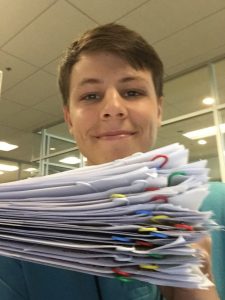Several weeks ago, I had a conversation with Dr Richardson about the different types of activities typically done within manufacturing engineering. At the beginning of the conversation, he said something like “Well first there’s sustaining, which is frankly a lot of paperwork.” Well this week at Boston consisted of a lot of sustaining engineering.
In my Week 7 blog post, I described a project that I’ve been working on involving data collection to start validating a new piece of equipment. The step we are currently trying to take is to conduct an experiment that should tell us which process parameters are most critical and a range of values for those parameters that would yield the best process outputs. I finished my data collection that helped us to define the values used in this experiment, as well as the full experiment plan, last week. At the start of this week, all that was left to do in order to start the experiments was to give the experiment to the production team. (It was important for the validation process that product builders use the machine to fabricate the parts and not interns.) I can definitely say I underestimated what would be involved in this request.
What I initially thought would be done on Monday to hand over this experiment ended up being completed a couple hours after I left work on Friday. The two main reasons it took so long were that there were several different documents that had to be consecutively approved by different people, and that we were trying to run 25 separate “non-standard orders,” which meant 25 iterations of every document. We couldn’t expect each document approver to respond as soon as we sent them what we needed, so it just took a while to get through everyone’s hands.
As I mentioned, the paperwork was completed after I left on Friday. Our goal was to start some of the runs on Monday, so we pushed hard to ensure everything was ready before everyone left for the day. I got to experience a taste of the high energy workstyle of manufacturing Friday as we were rushing around making sure all the paperwork was done and everyone had what they needed to start the orders early Monday morning. Having to leave with the rest of the Rice interns kept me from being able to stay until all the work was completed.
In my conversations with some of the Boston Scientific employees, I’ve learned that a major value offered by Boston Scientific (and most big medical device companies) is the reliability of their products. This experience showed me a lot of the people and structure involved with the robust quality system that ensures their products’ high reliability. While it’s always possible to make mistakes, I saw how Boston’s system made it difficult to accidentally compromise the quality of the products that go out the door. I also noted how difficult it would be for a smaller company to attain these high reliability standards.
Another exciting thing that happened this week was the assignment of our implementation projects (see Week 8 post for background). I was given my first choice of the projects, an app that will improve hospice care for patients in Brazil. I’m excited for both the challenge this project will be and the impact it will have. Most of my coding experience is in Matlab, while the app that I will be improving was done in a completely different language. There will be a significant learning curve moving from a language as high level as Matlab to one used for app development, but I purposely chose this project to gain more hard programming skills. Furthermore, the work I’ll be doing won’t just be a learning exercise, but will have a real impact on people who are in a difficult yet meaningful part of their life! I’m overjoyed I will get to work on a problem I care about!
We can all feel the summer drawing to an end with only 8 days left at Boston. I will be working hard to finish this internship strong and getting ready for the Fall back in Houston.

